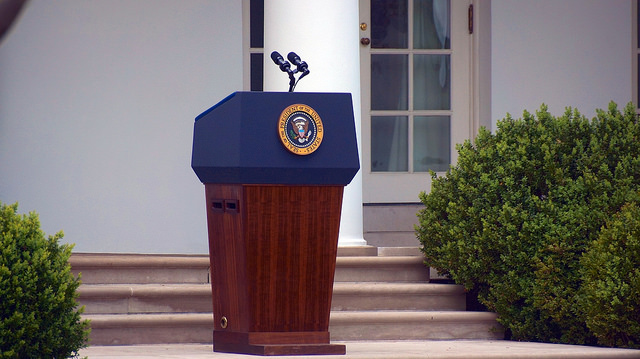
Court finds that election regulator failed to properly consider a rule on debate participation.
The Green Party has nominated a candidate in every presidential election since 2000. The Libertarian Party has nominated a candidate in every presidential election dating back to 1972. Yet none of these candidates has ever made it onto a presidential debate stage. A recent decision by a federal court may change that.
The U.S. District Court for the District of Columbia ruled in February that the Federal Election Commission (FEC) improperly dismissed complaints about how the Commission on Presidential Debates (CPD) determines who makes it onto the debate stage. The court found that the FEC “stuck its head in the sand” instead of considering the evidence submitted with the complaints. The agency was ordered to provide a reasoned and evidence-based explanation for its decision.
The CPD is a bipartisan, nonprofit organization that has staged all of the presidential debates since 1988. It is co-chaired by one Democrat and one Republican and has effectively excluded third parties by limiting presidential debate participation to candidates who receive at least 15 percent support in an average of national polls.
The CPD raises funds for the debates from local communities, corporations, and private donors. This fundraising could violate the Federal Election Campaign Act (FECA), which prohibits corporations from making donations or expenditures on behalf of presidential candidates. But the FEC promulgated regulations that exempted debate staging organizations like the CPD from the corporate donations ban so long as the organizations are nonpartisan, do not endorse a candidate, and use objective criteria when determining which candidates to include in a debate.
A complaint filed with the FEC by Level the Playing Field, a nonprofit organization that advocates for third-party candidates, alleged that the CPD does not meet the nonpartisan conditions laid out in the FEC’s regulations and violates the law.
The complaint argues that “our election system is rigged” and accuses the CPD of acting as a tool of the Democratic and Republican parties to the detriment of third-party candidates. It identified the polling threshold as part of “a host of anti-democratic election rules that deprive Americans of their ability to elect the leaders they prefer.”
The complaint included evidence that securing a 15 percent showing in national polls “is virtually impossible” without the financial support of a major party. A third-party candidate would have to spend over $250 million before the first debate, an amount that no third-party candidate has ever raised.
The FEC dismissed the complaint, pointing to its prior decisions on the subject without addressing all of the new evidence submitted with the complaint. “In sum,” said the FEC in its decision, “Complainants make the same allegations regarding the same candidate selection criteria that the Commission has considered and found insufficient.”
Level the Playing Field submitted a petition to the FEC along with its complaint asking the agency to make a rule prohibiting the use of polling thresholds to determine debate participation. The petition included much of the same evidence submitted in the complaint. The FEC dismissed the petition, saying simply that “[i]n the absence of any indication that polling thresholds are inherently unobjective or otherwise unlawful as applied to all federal elections…the Commission declines to initiate a rulemaking.”
Level the Playing Field then brought suit along with the Green Party and the Libertarian National Committee under a provision of the FECA that allows aggrieved parties to challenge dismissals by the FEC in federal court.
The court held that the FEC acted arbitrarily and capriciously when it dismissed the complaints, alleging that the CPD favors Democratic and Republican candidates. The court pointed to the agency’s “threadbare” consideration of the evidence, saying that it either applied an improper standard of review that was not in line with the FECA or did not review the complaints at all.
The court did not find “any evidence that the FEC considered the relevant factors or took a hard look at the evidence.” On the contrary, the court concluded that “the FEC fails to cite or discuss virtually any of the evidence submitted with Plaintiffs’ complaints.” The FEC discussed just two items from a large amount of evidence submitted with the complaints, including over 100 exhibits.
In a supporting brief submitted to the court, the CPD rebutted the idea that it has a responsibility to include third-party candidates in debates. It said that its “primary mission is to ensure, for the benefit of the American electorate, that general election debates are held every four years between and among the leading candidates who have a realistic (i.e. more than theoretical) chance of being elected.”
The CPD argued that including third-party candidates would undermine its objectives by “depriv[ing] the public of the opportunity to see debates that include the candidates in whom they have the greatest interest.” The CPD also said the lawsuit infringes on its free speech rights because sponsoring a debate is a matter of political speech that the government is restricted from regulating.
On the other hand, Nicholas Sarwark, Chair of the Libertarian National Committee, praised the court’s decision, saying, “the CPD has operated in a manner designed to support and perpetuate the two old parties and protect them from any political competition.” He also said that the FEC was “complicit by willfully ignoring the evidence that the CPD is running an illegal bipartisan campaign commercial.”
The court gave the FEC 30 days to reconsider its dismissal of the complaints and 60 days to reconsider the petition for a new rulemaking.
The photo of the White House Rose Garden lectern has not been altered and is used under a Creative Commons license.



